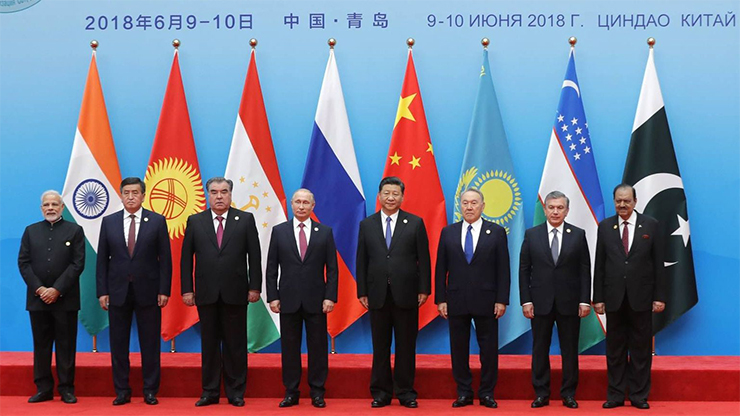While the recent Indo-Pak military stand-off did turn into actual hostilities and a small air-war as well, the way major powers—specifically, the U.S., Russia and China—responded to the crisis reveals how their respective responses not only reflected the existing geo-political realities, but also how these powers were actually making geo-political manoeuvers, motivated, of course, by their respective interests. For the U.S., it was high-time to push India more towards Saudi and UAE camp in order for completing their ‘Iran encirclement’ programme and use the crisis to put pressure on Pakistan in order to extract concession in Afghanistan; for Russia and China, it was high time to take the SCO to that level of regional diplomacy where regional conflicts could actually be mediated and tensions potentially diffused, even if not fully resolved. In doing so, Russia and China were obviously eyeing a greater Eurasian integration and enhancing the SCO’s regional and global profile at a time when ‘New Cold War’ conditions are clearly on the horizon.
The U.S. response was, in the light of its prevailing relations with Pakistan, pro-India, starting with Bolton’s defense of India’s right to “self-defence” following Pulwama. This is a standard U.S. position that it takes usually for its ally, Israel, in anticipation of the inevitable Israeli military action against the Palestinians. And, unlike in the past, no U.S. officials flew immediately to New Delhi or Islamabad to diffuse the crisis. Instead, the U.S. delegated this role to its ally, Saudi Arabia, a country that is least know for ever playing a mediatory role in any conflict, let alone those involving nuclear powers.
The U.S.’ pro-India position was deeply informed by its desire to use the crisis to put pressure on Pakistan through India at a juncture when the US-Taliban negotiations are at a critical stage and Islamabad’s cooperation is vital. In this behalf, it was revealing to see U.S. officials defending Indian position and not pointing to Islamabad (there were only passing references to it) for its ‘unwillingness’ to take action against terror groups
In the U.S. calculation, if Islamabad could be put under pressure, it would look towards the U.S. for mediation which might give the U.S. a leverage in Afghanistan and make Islamabad play by the its rules.
On the other hand, the reason why the U.S. didn’t do direct diplomacy and instead outsourced this role to Saudia reflects how the U.S. was capitalising on the recent Modi-MBS bromance and eyeing the ultimate objective of gradually weaning New Delhi away from Tehran—something that will be very crucial for the U.S.—Israeli plan to encircle Iran, cripple its access to big oil markets such as India’s and thus give a big blow to its economy that has already been hit hard by the fresh U.S. sanctions.
Russia-China response, on the contrary, was least informed by such geo-political concerns as ‘encirclement’ of a given country, but by the way the U.S. was actively promoting Saudi Arabian role in South Asia in order to wean India away from Tehran, a crucial ally of both Russia and China. What Russia and China accordingly did, as opposed to the U.S., was act of robust diplomacy.
On last Thursday, Russian president telephoned Modi. According to the Kremlin readout, they discussed the “crisis in relations between India and Pakistan” and the Russian leader “expressed hope for a prompt settlement.” The particularly careful wording hinted that Putin offered to lend a helping hand, jointly with China, to ease the tension.
Interestingly enough, Russian Foreign Minister called his Pakistani counterpart, Qureshi, and offered help to “de-escalate” the tensions. The Russian Foreign Ministry readout mentioned that “Moscow expressed its readiness to contribute to de-escalating tensions and that there is no alternative to settling all differences between Islamabad and New Delhi by political and diplomatic means.” Significantly enough, Lavrov also outlined to Qureshi how the de-escalation process could be achieved through the SCO’s mechanism of the Regional Anti-Terrorist Structure.
Simply put, if the U.S., by using Saudi Arabia, was trying to lure India, much like Pakistan, into “Arab NATO”, Russia’s offer was very much informed by keeping both countries within the SCO framework, which is undoubtedly turning into a potential counter-bloc to Western domination of global politics.
Regardless of what the U.S. was trying to achieve out of this crisis, there appear to be little chances of India (as also Pakistan) actually plunging into the “Arab NATO” or that it would prefer its relations with Saudia to those with Russia and thus turn its back towards the SCO.
After all, both Pakistan and India are South Asian powers and the offer to use SCO platform came at a time when India’s own minister of external affairs had just met her Russian and Chinese counter-parts on the sidelines of the RIC meet at Zhejiang, China. And, unlike the Cold War days and with Pakistan playing a central role in paving the way for a U.S. exit from Afghanistan, Pakistan is keen on Eurasian integration and scrap, for good, its status of a non-NATO U.S. ally in the ‘war on terror’ that is already fast nearing its end in this part of the world.
Salman Rafi Sheikh, research-analyst of International Relations and Pakistan’s foreign and domestic affairs, exclusively for the online magazine “New Eastern Outlook”.

